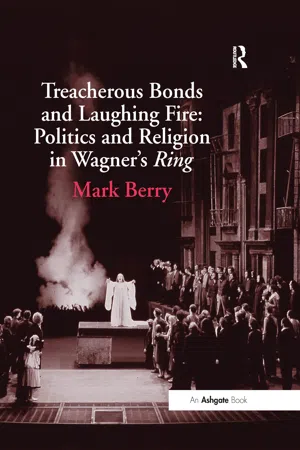
- 304 pages
- English
- ePUB (mobile friendly)
- Available on iOS & Android
Treacherous Bonds and Laughing Fire: Politics and Religion in Wagner's Ring
About This Book
Mark Berry explores the political and religious ideas expounded in Wagner's Ring through close attention to the text and drama, the multifarious intellectual influences upon the composer during the work's lengthy gestation and composition, and the wealth of Wagner source material. Many of his writings are explicitly political in their concerns, for Wagner was emphatically not a revolutionary solely for the sake of art. Yet it would be misleading to see even the most 'political' tracts as somehow divorced from the aesthetic realm; Wagner's radical challenge to liberal-democratic politics makes no such distinction. This book considers Wagner's treatment of various worlds: nature, politics, economics, and metaphysics, in order to explain just how radical that challenge is. Classical interpretations have tended to opt either for an 'optimistic' view of the Ring, centred upon the influence of Young Hegelian thought - in particular the philosophy of Ludwig Feuerbach - and Wagner's concomitant revolutionary politics, or for the 'pessimistic' option, removing the disillusioned Wagner-in-Swiss-exile from the political sphere and stressing the undoubtedly important role of Arthur Schopenhauer. Such an 'either-or' approach seriously misrepresents not only Wagner's compositional method but also his intellectual method. It also sidelines inconvenient aspects of the dramas that fail to 'fit' whichever interpretation is selected. Wagner's tendency is not progressively to recant previous 'errors' in his oeuvre. Radical ideas are not completely replaced by a Schopenhauerian world-view, however loudly the composer might come to trumpet his apparent 'conversion'. Nor is Wagner's truly an Hegelian method, although Hegelian dialectic plays an important role. In fact, Wagner is in many ways not really a systematic thinker at all (which is not to portray him as self-consciously unsystematic in a Nietzschean, let alone 'post-modernist' fashion).
Frequently asked questions
Information
Table of contents
- Cover Page
- Title Page
- Copyright Page
- Contents
- Music examples
- Preface and acknowledgements
- Abbreviations
- Introduction: Problems and opportunities
- 1 The intellectual and biographical background
- 2 Musical drama
- 3 The natural world and its despoliation
- 4 Property, capital, and production
- 5 Law, government, and the state
- 6 The strength and weakness of religion
- 7 Power or love
- 8 Revolution
- 9 Renunciation
- 10 Annihilation, redemption, and augury
- Index